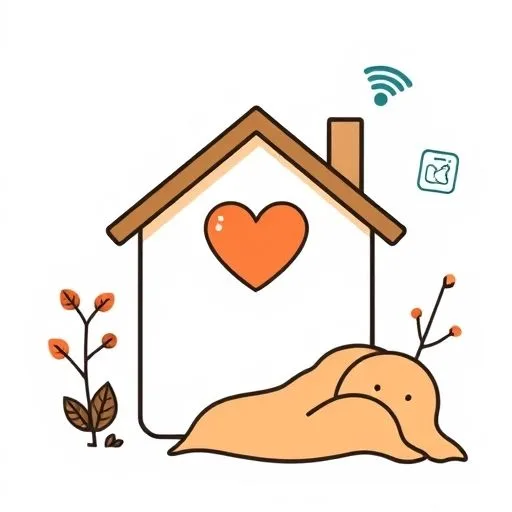
Have you ever thought about it? In these quiet moments after the kids are asleep, when the day’s hustle settles, it hits me how deeply AI technology has woven itself into our everyday lives.
From the kids getting a little help with homework to us figuring out dinner recommendations, AI is right there. And it makes me realize how important it is to really understand AI, and how to approach it.
It’s almost surprising, isn’t it, to think that our small conversations and habits at home might connect to the bigger picture of responsible AI that the world is grappling with? When I think of it not just as technology, but as a way to embed our family’s values and wisdom, it really hits home.
Bringing Global AI Ethics Home to Our Living Room

We hear a lot about AI ethics, fairness, and transparency in the news lately, don’t we? At first, it sounded so complex, but then I realized, it’s really a lot like how we raise our kids.
Those international AI ethical guidelines talk about being fair to everyone, explaining decisions clearly. That’s exactly how we want our kids to be—to treat everyone equally, to be honest and open.
For example, when we carefully check the privacy policies of apps our children use, isn’t that really an expression of wanting AI to operate fairly and transparently? It’s like wanting our kids to play freely in a safe environment.
Ever had one of those moments when AI makes a suggestion that’s way off-base? AI can feel like a smart assistant or a friendly aunt who’s helping us out. But just like we give clear instructions to an assistant, teaching them how to act in certain situations, AI also needs a ‘user manual’ that reflects our values. We get to be the ones to actively shape those guidelines. Sometimes, our smart fridge might ask, ‘How about kimchi stew for dinner tonight?’ And if it recommends a recipe with ingredients none of us like, that’s our chance to laugh and say, ‘AI, maybe not this time!’ It becomes a fun moment to teach AI about our family’s tastes and ethical boundaries. It’s like how we always explain the world to our kids at their level; we’re doing the same for AI, showing it our family’s world.
Planting Seeds of Ethical Innovation Through Small Questions

Our kids, they ask ‘why?’ constantly when they’re little, don’t they? That same curiosity is so important when they interact with AI. It’s not just about accepting the answers AI gives, but encouraging them to ask, ‘How did AI come up with this answer?’, or ‘Why did it suggest this?’ We want them to wonder about the process and the intention, just like we always listen seriously to their questions and help them think things through. This is where we start building healthy AI parenting ethics.
For instance, if an e-book app for kids always shows certain professions filled by just one gender, we can talk about it together. ‘Does this really represent everyone?’ we might ask. They’ll naturally learn that the data AI learns from can have biases. Kids’ eyes are often sharper than ours, aren’t they? Those small discoveries build critical thinking, and ultimately, they become the force that helps AI evolve for the better.
After all, AI is a tool we use. Teaching them that the outcome depends on the mindset we bring to using that tool is crucial.
That a warm heart, full of consideration and fairness, can make AI’s capabilities shine even brighter.
Remember when our child got upset because the robot vacuum said, ‘All cats sleep in boxes,’ and they blurted out, ‘But our cat sleeps in a bed!’? It was such a good moment for them to realize that what AI learns comes from people’s input. Watching us explain it at their level, that memory always sticks with me.
Our Family’s Daily Habits for a Better Digital Future

We don’t need to overthink these discussions about AI ethics. Just sitting on the couch together watching TV, or during dinner, or even before bedtime, asking ‘How was that app you used today?’ or ‘Did anything feel off?’ is enough. Just like we, even after a long day wrestling with the kids, never miss listening to their little stories. Those conversations naturally help them develop a healthy perspective on the digital world, fostering a new kind of tech savvy for Generation AI.
It’s also really important for us to model the habit of questioning information we find online. ‘Is this really true?’ We check things twice, just like we always carefully verify information and make wise decisions. Our kids will naturally develop critical thinking skills. Sometimes, when our kids say, ‘Mom, Dad, I want to read a picture book instead of using my smartphone today!’ it fills me with such pride. It’s a moment where they show responsible use of digital tools. We even joked once, all together, ‘Smart speaker, please play a lullaby, but don’t include Dad’s snoring!’ Everyone agreed that even machines need a ‘quiet boundary’ for our family’s peaceful night. These small steps? They’re building a future where our kids thrive—with heart, smarts, and all the warmth we can give.
Source: Global AI ethics standards in works, will be adopted once finalised: Consumer Affairs Secretary, Economic Times, 2025/09/17 09:32:07Latest Posts
